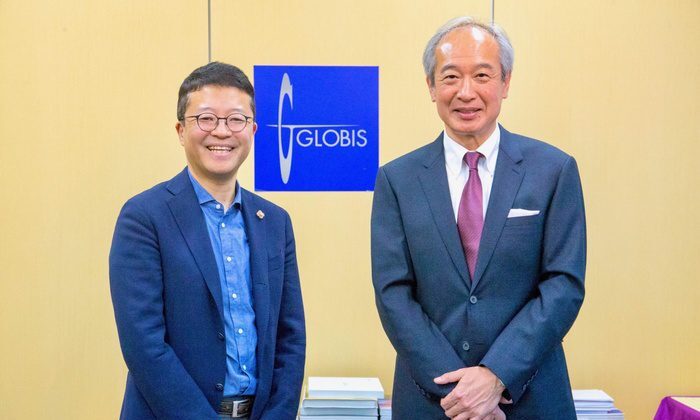How are management education and AI tied together? How should we go about making use of AI to nurture workplace talent? Kenichi Suzuki, faculty of GLOBIS and director of GAiMERi (GLOBIS AI Management Education Research Institute) joined Kazushi Kuse, CTO of IBM Japan to discuss these issues and how to train the future generation of business leaders.
Kuse: What kind of issues does GLOBIS try to solve using AI? And what’s challenging about facing those issues?
Suzuki: We’re interested in nurturing future generations of managers and business leaders by improving the efficiency and sophistication of our teaching. For this, we use AI. We also teach leaders themselves to use AI so they can get comfortable with it.
Our problem – which is actually something faced throughout the education sector, not just at GLOBIS – is that we found we needed to improve the efficiency of our work on reporting and testing.
In classes like those at GLOBIS, the experience is about active learning. Students interact with one another, making comments during class discussions and group work, and giving each other feedback during class. In management education, it is often the case that there is no single right answer. Usually the problems and questions we face require thinking through discussion.
Kuse: So, we could say you’re trying to keep education personalized while still using AI.
Suzuki: That’s right. In the grand scheme of things, I feel it is necessary to personalize education, so each student can reach their own answer.
Education is currently carried out mainly in groups, but I think that there are some skills that can be honed through individualized instruction, much in the way that in ancient times, Alexander the Great was taught by his teacher, Aristotle.
It might be possible to apply technology such as natural language analysis, which I know IBM’s Watson is good at, to provide individualized education without increasing the burden on the school.
Kuse: It sounds like you’re attacking a very important problem. We’re using Watson to support teaching assistant jobs at Georgia Tech, so I understand challenges such as answering questions which have more than one answer.
Big data is one of the most underutilized knowledge sources out there. Hopefully, GLOBIS will be able to help that problem by both collecting data and sharing its importance with future leaders.
Suzuki: We also expect to apply AI to measure the learning effect. Amongst all this data, I want to visualize exactly where the learning effect is created, and where the students’ “Aha!” moment is found.
For example, if we can transcribe student remarks using text mining or IoT-like technology, we will be able to objectively analyze engagement in the classroom. This could become a whole new form of effective management education.
Kuse: Another issue is how to develop managers who can fully use AI for business management.
Suzuki: That’s right. At GLOBIS, we seek to nurture visionary leaders who create and innovate societies. We live in an intense period of change. It is becoming more and more challenging to revolutionize and create new business without ICT. This is why we’ve been transitioning our curriculum towards what we call “Technovate,” which is our own portmanteau of “technology” and “innovate.”
Kuse: You mentioned earlier the personalized management education is becoming more important. At terakoya (temple schools) in the Edo Era, a kind of diversity was realized through different ages, backgrounds, personalities, etc. All of the students learned through collaboration. GLOBIS could be leading the next generation of management education, a kind of super-advanced terakoya.
IBM describes AI as augmented intelligence, not artificial intelligence, for supporting humans. AI will not exceed or replace humans. AI will collaborate with us through technology and management.
Suzuki: AI is good at optimizing towards a purpose, but we humans are better at “noticing” based on that information. We tend to work better incrementally by forming and testing hypotheses. Augmented management education might help us build upon “wild ideas” with enormous amounts of information. This will free us up to gain a better understanding of problems even before we solve them.




